Salvador(Arena Fonte Nova)
When the Portuguese crown first decided to carry out the endeavour of colonising Brazil, the first urban area to be settled in was Salvador, which was established on 29 March 1549. This is one of the reasons why the coastal city in the country's north-east was one of the main poles of slave trade in South America. As a consequence, Salvador grew under deep influence of Portuguese, Afro-descendents and indigenous alike: a situation that contributed to the cultural richness that typifies the city today.
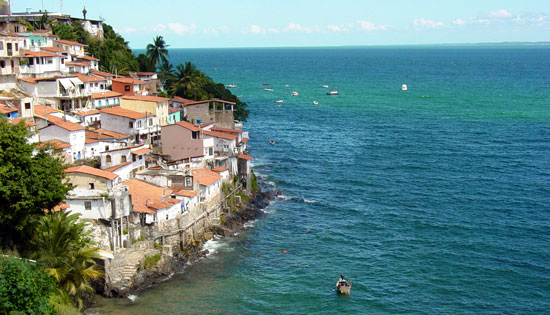
The presence of African elements is all around in Salvador, from the circles of capoeira (a combination of martial art and dance brought to Brazil by African slaves) at the Modelo Martket to the beat of the agogôs and atabaques (percussion instruments) in the rites of the Candomblé - a syncretic religion conceived in Brazil. Such African heritage has awarded Salvador with the nickname Roma Negra (Black Rome).
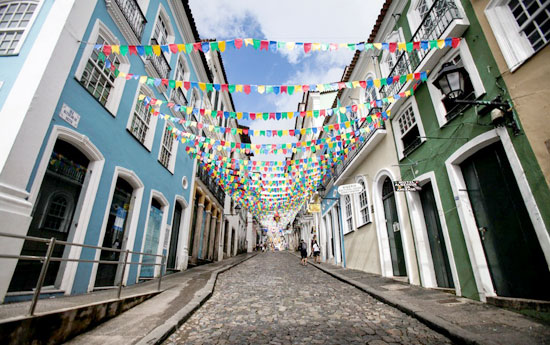
Salvador's privileged topography is one of its most appealing attributes, with a clear division between the Cidade Baixa and Cidade Alta (Low City and High City), both of which are connected to each other by one of the city's most important sights, the Elevador Lacerda. But the ultimate icon of the city is the Pelourinho, which is its historical centre: its churches and colourful colonial buildings have been a World Heritage Site by UNESCO in 1985.
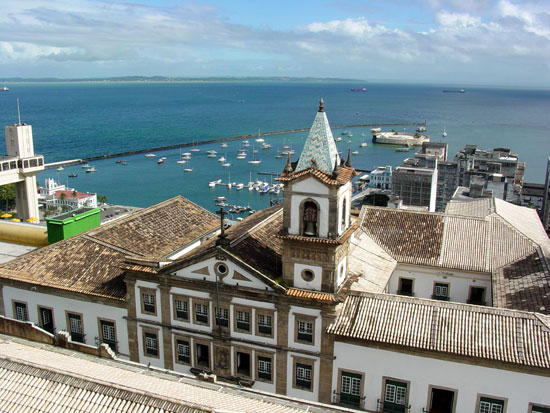
Besides being a historical gem and the birthplace of several of Brazil's most significant artists, the capital of the state of Bahia has also grown and developed to become the economic centre in the north-east and the country's third-most populous city, with roughly three million residents.
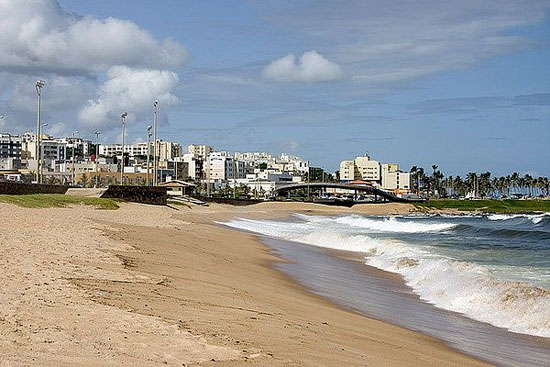
Football
It comes as a surprise to no-one after an edition of the Campeonato Brasileiro when the figures show that a team from Salvador - either Esporte Clube Bahia or Esporte Clube Vitória - topped the attendance average charts. The soteropolitanos are as mad about football as anyone else in Brazil.
The two rivals comfortably dominate the football scene within the state of Bahia, and have an important national background as well: Bahia, the Tricolor, won the Campeonato Brasileiro in 1988 and the Taca Brasil in 1959 (a predecessor of the national championships), while Vitória have collected three North-east Cup titles and were runners-up in the Brasileiro in 1993. The Leão are also famous for housing one of the best youth academies in the country, having produced the likes of FIFA World Cup™ champions Bebeto and Dida.
One of the most fantastic moments for one to be in Salvador - only comparable to the city's vivacious Carnival celebrations - is during a Ba-Vi, the famous derby between the two rivals. While Vitoria owns the Barradão and EC Bahia plays its home matches at state-owned Pituaçu, the ultimate stage for big matches at the state of Bahia is the Fonte Nova, which has been closed since 2007. The former stadium was imploded and a brand new one is being built upon the same ground to host the FIFA World Cup.
Owner: Bahia(BA)
Capacity: 48747
Country: Brazil
City: Salvador
Address: Ladeira da Fonte das Pedras, s/n - Nazaré, Salvador - Bahia, 40050-565, Brazil
Value: About $270 million
Inauguration: 1951
Average temperature in June: 26.5°C
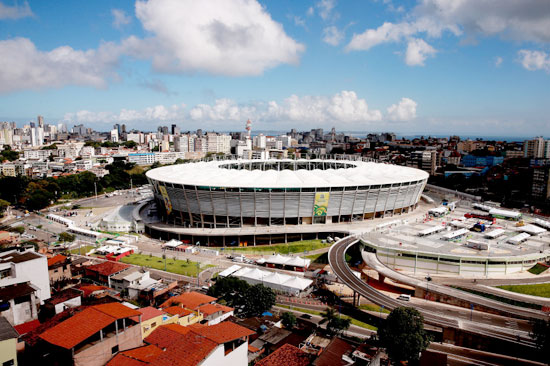
Profile:
The first capital city in Brazil’s history, Salvador will welcome the 2014 FIFA World Cup Brazil™ at a new, purpose-built stadium with a capacity of 52,048. The new arena will host six games at the tournament and has been constructed on the site of the Fonte Nova.
Officially known as the Estadio Octavio Mangabeira, the Fonte Nova was opened on 28 January 1951 and was the venue for many a derby between Salavador’s Esporte Clube Bahia and Esporte Clube Vitoria. It was closed in November 2007 and subsequently demolished three years later.
The stadium that has risen in its place, the Arena Fonte Nova, has been modelled on its predecessor and is covered by a lightweight, metal roof. A public-private joint venture, the complex will house a panoramic restaurant, museum of football, car parks, shops, hotels and a concert hall.
Maintaining the proud tradition of the Fonte Nova, the new stadium will host four group matches, three of them featuring top-seeded teams, as well as a Round-of-16 match and a quarter-final tie.
Matches:
13/06/2014 16:00 Spain vs. Netherlands
16/06/2014 13:00 Germany vs. Portugal
20/06/2014 16:00 Switzerland vs. France
25/06/2014 13:00 Bosnia-Herzegovina vs. Iran
01/07/2014 17:00 Round of 16 1H vs. 2G
05/07/2014 17:00 Quarter-finals W51 vs. W52
Local hero:
Bebeto, the former Brazil international, now 49, was born in Salvador and is revered in the city, named as one of the six ambassadors for the 2014 World Cup. He started his career at tiny Salvador club Vitoria.
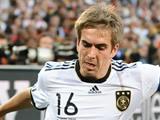
Legends pay tribute to Gerrard & Lahm
International retirements follow Wo...
- Year
- Winner
- Runner-up
- Third place
